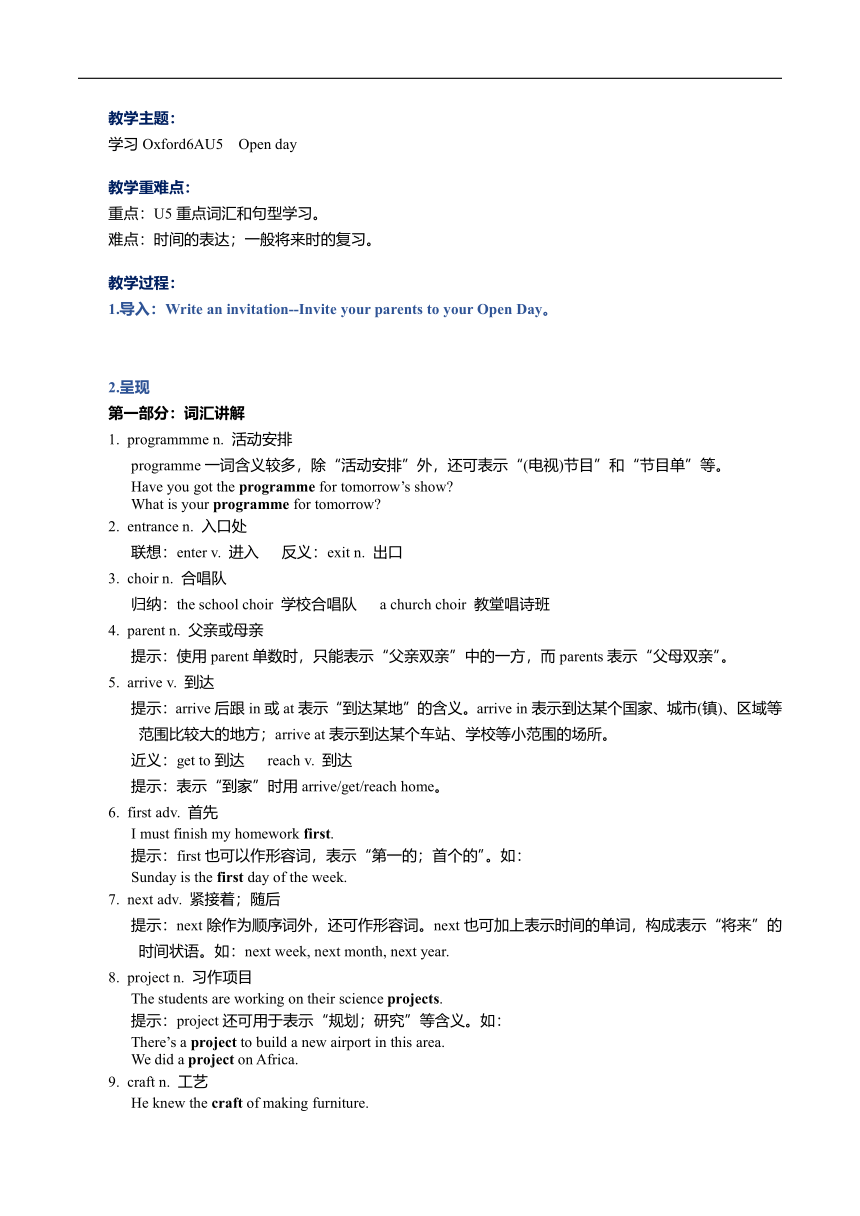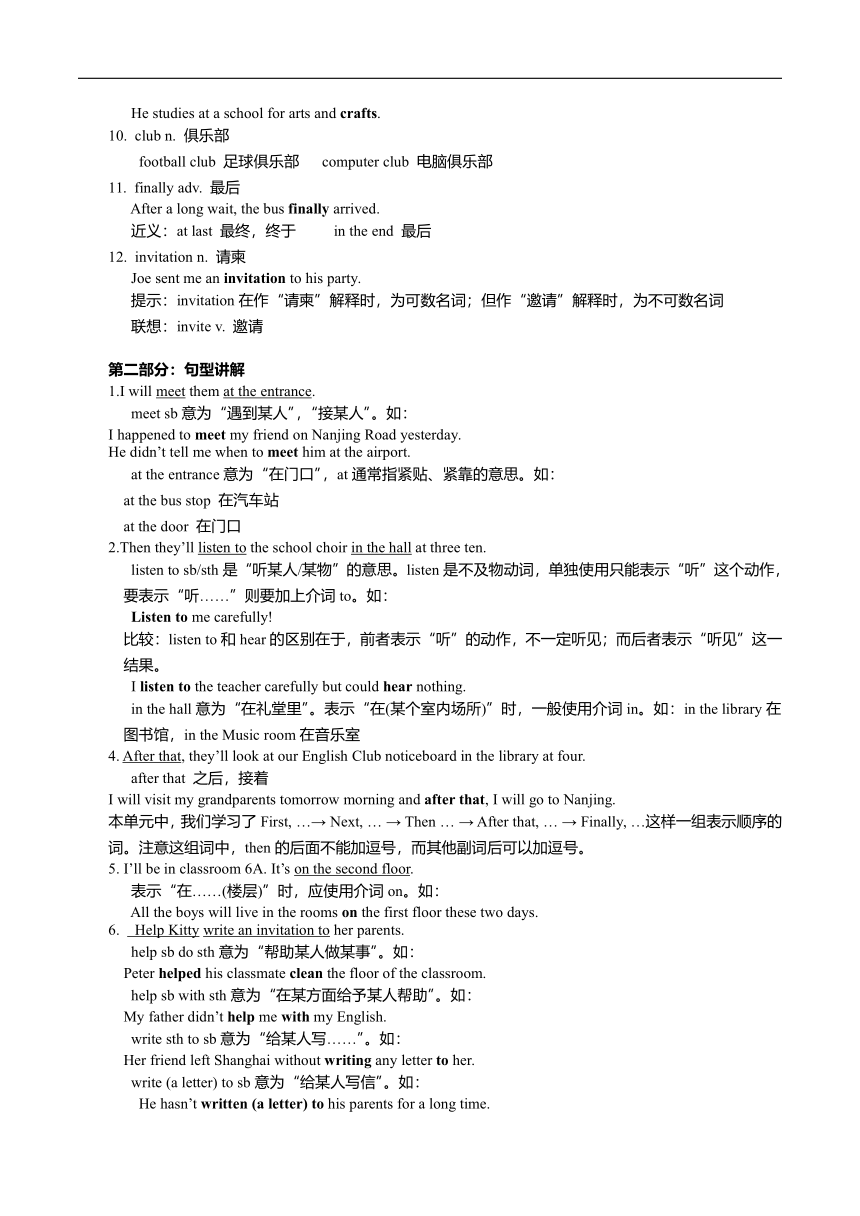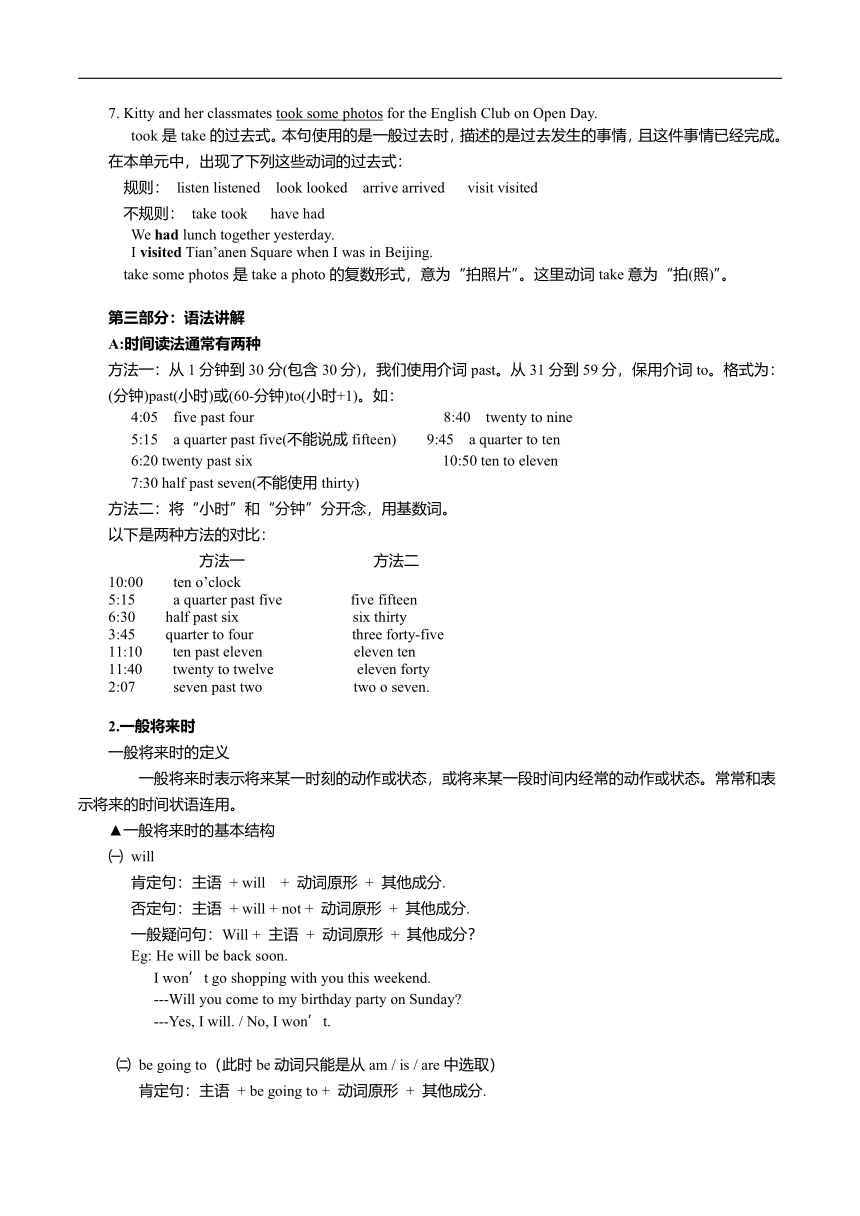Unit 5 Open day 学案(无答案)
文档属性
| 名称 | Unit 5 Open day 学案(无答案) |  | |
| 格式 | docx | ||
| 文件大小 | 28.6KB | ||
| 资源类型 | 教案 | ||
| 版本资源 | 牛津上海版(试用本) | ||
| 科目 | 英语 | ||
| 更新时间 | 2021-09-22 11:34:43 | ||
图片预览



文档简介
教学主题:
学习Oxford6AU5
Open
day
教学重难点:
重点:U5重点词汇和句型学习。
难点:时间的表达;一般将来时的复习。
教学过程:
导入:Write
an
invitation--Invite
your
parents
to
your
Open
Day。
2.呈现
第一部分:词汇讲解
programmme
n.
活动安排
programme一词含义较多,除“活动安排”外,还可表示“(电视)节目”和“节目单”等。
Have
you
got
the
programme
for
tomorrow’s
show?
What
is
your
programme
for
tomorrow?
entrance
n.
入口处
联想:enter
v.
进入
反义:exit
n.
出口
choir
n.
合唱队
归纳:the
school
choir
学校合唱队
a
church
choir
教堂唱诗班
parent
n.
父亲或母亲
提示:使用parent单数时,只能表示“父亲双亲”中的一方,而parents表示“父母双亲”。
arrive
v.
到达
提示:arrive后跟in或at表示“到达某地”的含义。arrive
in表示到达某个国家、城市(镇)、区域等范围比较大的地方;arrive
at表示到达某个车站、学校等小范围的场所。
近义:get
to到达
reach
v.
到达
提示:表示“到家”时用arrive/get/reach
home。
first
adv.
首先
I
must
finish
my
homework
first.
提示:first也可以作形容词,表示“第一的;首个的”。如:
Sunday
is
the
first
day
of
the
week.
next
adv.
紧接着;随后
提示:next除作为顺序词外,还可作形容词。next也可加上表示时间的单词,构成表示“将来”的时间状语。如:next
week,
next
month,
next
year.
project
n.
习作项目
The
students
are
working
on
their
science
projects.
提示:project还可用于表示“规划;研究”等含义。如:
There’s
a
project
to
build
a
new
airport
in
this
area.
We
did
a
project
on
Africa.
craft
n.
工艺
He
knew
the
craft
of
making
furniture.
He
studies
at
a
school
for
arts
and
crafts.
club
n.
俱乐部
football
club
足球俱乐部
computer
club
电脑俱乐部
finally
adv.
最后
After
a
long
wait,
the
bus
finally
arrived.
近义:at
last
最终,终于
in
the
end
最后
invitation
n.
请柬
Joe
sent
me
an
invitation
to
his
party.
提示:invitation在作“请柬”解释时,为可数名词;但作“邀请”解释时,为不可数名词
联想:invite
v.
邀请
第二部分:句型讲解
1.I
will
meet
them
at
the
entrance.
meet
sb意为“遇到某人”,“接某人”。如:
I
happened
to
meet
my
friend
on
Nanjing
Road
yesterday.
He
didn’t
tell
me
when
to
meet
him
at
the
airport.
at
the
entrance意为“在门口”,at通常指紧贴、紧靠的意思。如:
at
the
bus
stop
在汽车站
at
the
door
在门口
2.Then
they’ll
listen
to
the
school
choir
in
the
hall
at
three
ten.
listen
to
sb/sth是“听某人/某物”的意思。listen是不及物动词,单独使用只能表示“听”这个动作,要表示“听……”则要加上介词to。如:
Listen
to
me
carefully!
比较:listen
to和hear的区别在于,前者表示“听”的动作,不一定听见;而后者表示“听见”这一结果。
I
listen
to
the
teacher
carefully
but
could
hear
nothing.
in
the
hall意为“在礼堂里”。表示“在(某个室内场所)”时,一般使用介词in。如:in
the
library在图书馆,in
the
Music
room在音乐室
4.
After
that,
they’ll
look
at
our
English
Club
noticeboard
in
the
library
at
four.
after
that
之后,接着
I
will
visit
my
grandparents
tomorrow
morning
and
after
that,
I
will
go
to
Nanjing.
本单元中,我们学习了First,
…→
Next,
…
→
Then
…
→
After
that,
…
→
Finally,
…这样一组表示顺序的词。注意这组词中,then的后面不能加逗号,而其他副词后可以加逗号。
5.
I’ll
be
in
classroom
6A.
It’s
on
the
second
floor.
表示“在……(楼层)”时,应使用介词on。如:
All
the
boys
will
live
in
the
rooms
on
the
first
floor
these
two
days.
6.
Help
Kitty
write
an
invitation
to
her
parents.
help
sb
do
sth意为“帮助某人做某事”。如:
Peter
helped
his
classmate
clean
the
floor
of
the
classroom.
help
sb
with
sth意为“在某方面给予某人帮助”。如:
My
father
didn’t
help
me
with
my
English.
write
sth
to
sb意为“给某人写……”。如:
Her
friend
left
Shanghai
without
writing
any
letter
to
her.
write
(a
letter)
to
sb意为“给某人写信”。如:
He
hasn’t
written
(a
letter)
to
his
parents
for
a
long
time.
7.
Kitty
and
her
classmates
took
some
photos
for
the
English
Club
on
Open
Day.
took是take的过去式。本句使用的是一般过去时,描述的是过去发生的事情,且这件事情已经完成。在本单元中,出现了下列这些动词的过去式:
规则:
listen
listened
look
looked
arrive
arrived
visit
visited
不规则:
take
took
have
had
We
had
lunch
together
yesterday.
I
visited
Tian’anen
Square
when
I
was
in
Beijing.
take
some
photos是take
a
photo的复数形式,意为“拍照片”。这里动词take意为“拍(照)”。
第三部分:语法讲解
A:时间读法通常有两种
方法一:从1分钟到30分(包含30分),我们使用介词past。从31分到59分,保用介词to。格式为:(分钟)past(小时)或(60-分钟)to(小时+1)。如:
4:05
five
past
four
8:40
twenty
to
nine
5:15
a
quarter
past
five(不能说成fifteen)
9:45
a
quarter
to
ten
6:20
twenty
past
six
10:50
ten
to
eleven
7:30
half
past
seven(不能使用thirty)
方法二:将“小时”和“分钟”分开念,用基数词。
以下是两种方法的对比:
方法一
方法二
10:00
ten
o’clock
5:15
a
quarter
past
five
five
fifteen
6:30
half
past
six
six
thirty
3:45
quarter
to
four
three
forty-five
11:10
ten
past
eleven
eleven
ten
11:40
twenty
to
twelve
eleven
forty
2:07
seven
past
two
two
o
seven.
一般将来时
一般将来时的定义
一般将来时表示将来某一时刻的动作或状态,或将来某一段时间内经常的动作或状态。常常和表示将来的时间状语连用。
▲一般将来时的基本结构
㈠
will
肯定句:主语
+
will
+
动词原形
+
其他成分.
否定句:主语
+
will
+
not
+
动词原形
+
其他成分.
一般疑问句:Will
+
主语
+
动词原形
+
其他成分?
Eg:
He
will
be
back
soon.
I
won’t
go
shopping
with
you
this
weekend.
---Will
you
come
to
my
birthday
party
on
Sunday?
---Yes,
I
will.
/
No,
I
won’t.
㈡
be
going
to(此时be动词只能是从am
/
is
/
are中选取)
肯定句:主语
+
be
going
to
+
动词原形
+
其他成分.
否定句:主语
+
be
+
not
+
going
to
+
动词原形
+
其他成分.
一般疑问句:Be
+
主语
+
going
to
+
动词原形
+
其他成分?
Eg:
I
am
going
to
fly
to
Hong
Kong
next
Monday.
He
is
not
going
to
play
basketball
at
three.
---Are
you
going
to
clime
the
Wu
Tong
Mountain
this
weekend?
---Yes,
I
am.
/
No,
I
am
not.
注意:
1)一般疑问句:be或will提到句首,some改any,
and改or,第一二人称互换
We
are
going
to
go
on
an
outing
this
weekend.
Are
you
going
to
go
on
an
outing
this
weekend?
2)will
常简略为
'll,并与主语连写在一起,
如:I'll,he'll,it'll,we'll,you'll,they'll;will
not
常缩写成won’t,shall
not
缩写成
shan't
★Will
和be
going
to的区别
Will:
1)表示“带意愿色彩的将来”
I
will
stay
with
and
help
you
2)在征求对方意见或表示客气的要求、命令时
Will
you
go
to
the
park
with
me?
/
will
you
please
open
the
door?
3)表示不以人的意志为转移,自然发展的未来的事,只用will
I
will
be
14-year-
old
next
year.
Tomorrow
will
be
Sunday.
Be
going
to:
1)常用于口语中,用来表示即将发生的动作或存在的状态
we
are
going
to
help
the
farmers
in
the
farm
2)有迹象表明必将发生某事
Look
at
these
clouds.
It's
going
to
rain.
1.
He
is
going
to
see
a
film.(改为否定句)
He
is
________
________
to
see
a
film.
2.
They
are
going
to
have
a
barbecue.(改为一般疑问句)
________
________
________
to
have
a
barbecue?
3.
Will
you
go
with
me?(作否定回答)
No,
________
________.
4.
Is
he
going
to
be
a
teacher?(作否定回答)
No,
________
________.
5.
He
is
going
to
wash
dishes.(就划线部分提问)
________
is
he
going
to
________?
练习与检测
听力练习6AU5
课堂练习题。
用所给单词的正确形式填空。
Let’s
meet
at
the
(enter)
of
the
cinema.
You
must
finish
English
exercise
(one).
(final),
they
put
out
the
fire.
The
students’
(parent)
are
coming
on
Open
Day.
Kitty
and
her
classmate
took
some
(photo)
on
Open
Day.
She
is
going
to
write
some
(invite).
Jane
(have)
a
glass
of
milk
for
breakfast
this
morning.
Look!
The
bird
(fly)
in
the
sky.
Simon
always
(finish)
his
homework
before
dinner.
Last
Sunday
I
(visit)
Jinmao
Tower.
Tomorrow
they
(go)
shopping
at
Lianhua
supermarket.
按要求改写句子。
He
will
go
back
to
France
this
Sunday.(对划线部分提问)
will
he
back
to
France?
We
will
meet
them
at
the
entrance.(对划线部分提问)
will
you
them?
My
parents
visited
my
school
last
week.(对划线部分提问)
did
they
last
week?
She
arrived
at
school
late
this
morning.(改成疑问句)
she
at
school
late
this
morning.
The
plan
is
going
to
take
off
at
five.(对划线部分提问)
the
plane
going
to
take
off?
They’ll
visit
the
classrooms
at
two
fifteen.(改为否定句)
They
the
classroom
at
two
fifteen.
We’ll
look
at
the
English
Club
noticeboard
in
the
Arts
and
Crafts
room.(改为一般疑问句)
you
the
English
Club
noticeboard
in
the
Arts
and
Crafts
room?
We’ll
meet
our
parents
at
the
entrance
at
three
o’clock.(对划线部分提问)
will
you
meet
your
parents
at
three
o’clock?
The
English
lesson
will
start
at
ten
thirty.(对划线部分提问)
will
the
English
lesson
start?
4.小结
本次课主要是对6AU5的词汇和句型进行复习,能灵活运用于词性转换和句型转换。
本次课的重点是时间的表达方式以及对一般将来时的复习。。
5.作业
A:6AU5复习卷。
B:背诵重点知识点。
an
Open
Day
一个开放日
Open
day
programme
开放日活动安排
an
entrance
一个入口处
listen
to
a
choir
听一个合唱队(唱歌)
a
noticeboard
一块布告栏
my
parents
我的父母亲
meet
sb.
at
the
entrance
在入口处迎接某人
arrive
in
+
大地方
到达一个大地方
arrive
at
+
小地方
到达一个小地方
visit
the
classroom
参观教室
First,
…
/Next,
…
/Then,
…/
After
that,
…/
Finally,
…
首先,紧接着,然后,在那以后,最后
look
at
our
class
projects
看一看我们的班级习作项目
in
the
Arts
and
Crafts
room
在美术劳技室
in
the
hall
在大厅里
our
English
Club
我们的英语俱乐部
have
tea
and
cakes
喝茶吃蛋糕
in
the
Music
room
在音乐室
welcome
the
parents
on
the
Open
Day
在开放日欢迎父母
in
different
places
在不同的地方
on
the
ground
floor
在第一层(英式表达法)
write
an
invitation
写一封邀请函
take
some
photos
拍一些照片
23.
have
a
great/good
time
过得愉快
学习Oxford6AU5
Open
day
教学重难点:
重点:U5重点词汇和句型学习。
难点:时间的表达;一般将来时的复习。
教学过程:
导入:Write
an
invitation--Invite
your
parents
to
your
Open
Day。
2.呈现
第一部分:词汇讲解
programmme
n.
活动安排
programme一词含义较多,除“活动安排”外,还可表示“(电视)节目”和“节目单”等。
Have
you
got
the
programme
for
tomorrow’s
show?
What
is
your
programme
for
tomorrow?
entrance
n.
入口处
联想:enter
v.
进入
反义:exit
n.
出口
choir
n.
合唱队
归纳:the
school
choir
学校合唱队
a
church
choir
教堂唱诗班
parent
n.
父亲或母亲
提示:使用parent单数时,只能表示“父亲双亲”中的一方,而parents表示“父母双亲”。
arrive
v.
到达
提示:arrive后跟in或at表示“到达某地”的含义。arrive
in表示到达某个国家、城市(镇)、区域等范围比较大的地方;arrive
at表示到达某个车站、学校等小范围的场所。
近义:get
to到达
reach
v.
到达
提示:表示“到家”时用arrive/get/reach
home。
first
adv.
首先
I
must
finish
my
homework
first.
提示:first也可以作形容词,表示“第一的;首个的”。如:
Sunday
is
the
first
day
of
the
week.
next
adv.
紧接着;随后
提示:next除作为顺序词外,还可作形容词。next也可加上表示时间的单词,构成表示“将来”的时间状语。如:next
week,
next
month,
next
year.
project
n.
习作项目
The
students
are
working
on
their
science
projects.
提示:project还可用于表示“规划;研究”等含义。如:
There’s
a
project
to
build
a
new
airport
in
this
area.
We
did
a
project
on
Africa.
craft
n.
工艺
He
knew
the
craft
of
making
furniture.
He
studies
at
a
school
for
arts
and
crafts.
club
n.
俱乐部
football
club
足球俱乐部
computer
club
电脑俱乐部
finally
adv.
最后
After
a
long
wait,
the
bus
finally
arrived.
近义:at
last
最终,终于
in
the
end
最后
invitation
n.
请柬
Joe
sent
me
an
invitation
to
his
party.
提示:invitation在作“请柬”解释时,为可数名词;但作“邀请”解释时,为不可数名词
联想:invite
v.
邀请
第二部分:句型讲解
1.I
will
meet
them
at
the
entrance.
meet
sb意为“遇到某人”,“接某人”。如:
I
happened
to
meet
my
friend
on
Nanjing
Road
yesterday.
He
didn’t
tell
me
when
to
meet
him
at
the
airport.
at
the
entrance意为“在门口”,at通常指紧贴、紧靠的意思。如:
at
the
bus
stop
在汽车站
at
the
door
在门口
2.Then
they’ll
listen
to
the
school
choir
in
the
hall
at
three
ten.
listen
to
sb/sth是“听某人/某物”的意思。listen是不及物动词,单独使用只能表示“听”这个动作,要表示“听……”则要加上介词to。如:
Listen
to
me
carefully!
比较:listen
to和hear的区别在于,前者表示“听”的动作,不一定听见;而后者表示“听见”这一结果。
I
listen
to
the
teacher
carefully
but
could
hear
nothing.
in
the
hall意为“在礼堂里”。表示“在(某个室内场所)”时,一般使用介词in。如:in
the
library在图书馆,in
the
Music
room在音乐室
4.
After
that,
they’ll
look
at
our
English
Club
noticeboard
in
the
library
at
four.
after
that
之后,接着
I
will
visit
my
grandparents
tomorrow
morning
and
after
that,
I
will
go
to
Nanjing.
本单元中,我们学习了First,
…→
Next,
…
→
Then
…
→
After
that,
…
→
Finally,
…这样一组表示顺序的词。注意这组词中,then的后面不能加逗号,而其他副词后可以加逗号。
5.
I’ll
be
in
classroom
6A.
It’s
on
the
second
floor.
表示“在……(楼层)”时,应使用介词on。如:
All
the
boys
will
live
in
the
rooms
on
the
first
floor
these
two
days.
6.
Help
Kitty
write
an
invitation
to
her
parents.
help
sb
do
sth意为“帮助某人做某事”。如:
Peter
helped
his
classmate
clean
the
floor
of
the
classroom.
help
sb
with
sth意为“在某方面给予某人帮助”。如:
My
father
didn’t
help
me
with
my
English.
write
sth
to
sb意为“给某人写……”。如:
Her
friend
left
Shanghai
without
writing
any
letter
to
her.
write
(a
letter)
to
sb意为“给某人写信”。如:
He
hasn’t
written
(a
letter)
to
his
parents
for
a
long
time.
7.
Kitty
and
her
classmates
took
some
photos
for
the
English
Club
on
Open
Day.
took是take的过去式。本句使用的是一般过去时,描述的是过去发生的事情,且这件事情已经完成。在本单元中,出现了下列这些动词的过去式:
规则:
listen
listened
look
looked
arrive
arrived
visit
visited
不规则:
take
took
have
had
We
had
lunch
together
yesterday.
I
visited
Tian’anen
Square
when
I
was
in
Beijing.
take
some
photos是take
a
photo的复数形式,意为“拍照片”。这里动词take意为“拍(照)”。
第三部分:语法讲解
A:时间读法通常有两种
方法一:从1分钟到30分(包含30分),我们使用介词past。从31分到59分,保用介词to。格式为:(分钟)past(小时)或(60-分钟)to(小时+1)。如:
4:05
five
past
four
8:40
twenty
to
nine
5:15
a
quarter
past
five(不能说成fifteen)
9:45
a
quarter
to
ten
6:20
twenty
past
six
10:50
ten
to
eleven
7:30
half
past
seven(不能使用thirty)
方法二:将“小时”和“分钟”分开念,用基数词。
以下是两种方法的对比:
方法一
方法二
10:00
ten
o’clock
5:15
a
quarter
past
five
five
fifteen
6:30
half
past
six
six
thirty
3:45
quarter
to
four
three
forty-five
11:10
ten
past
eleven
eleven
ten
11:40
twenty
to
twelve
eleven
forty
2:07
seven
past
two
two
o
seven.
一般将来时
一般将来时的定义
一般将来时表示将来某一时刻的动作或状态,或将来某一段时间内经常的动作或状态。常常和表示将来的时间状语连用。
▲一般将来时的基本结构
㈠
will
肯定句:主语
+
will
+
动词原形
+
其他成分.
否定句:主语
+
will
+
not
+
动词原形
+
其他成分.
一般疑问句:Will
+
主语
+
动词原形
+
其他成分?
Eg:
He
will
be
back
soon.
I
won’t
go
shopping
with
you
this
weekend.
---Will
you
come
to
my
birthday
party
on
Sunday?
---Yes,
I
will.
/
No,
I
won’t.
㈡
be
going
to(此时be动词只能是从am
/
is
/
are中选取)
肯定句:主语
+
be
going
to
+
动词原形
+
其他成分.
否定句:主语
+
be
+
not
+
going
to
+
动词原形
+
其他成分.
一般疑问句:Be
+
主语
+
going
to
+
动词原形
+
其他成分?
Eg:
I
am
going
to
fly
to
Hong
Kong
next
Monday.
He
is
not
going
to
play
basketball
at
three.
---Are
you
going
to
clime
the
Wu
Tong
Mountain
this
weekend?
---Yes,
I
am.
/
No,
I
am
not.
注意:
1)一般疑问句:be或will提到句首,some改any,
and改or,第一二人称互换
We
are
going
to
go
on
an
outing
this
weekend.
Are
you
going
to
go
on
an
outing
this
weekend?
2)will
常简略为
'll,并与主语连写在一起,
如:I'll,he'll,it'll,we'll,you'll,they'll;will
not
常缩写成won’t,shall
not
缩写成
shan't
★Will
和be
going
to的区别
Will:
1)表示“带意愿色彩的将来”
I
will
stay
with
and
help
you
2)在征求对方意见或表示客气的要求、命令时
Will
you
go
to
the
park
with
me?
/
will
you
please
open
the
door?
3)表示不以人的意志为转移,自然发展的未来的事,只用will
I
will
be
14-year-
old
next
year.
Tomorrow
will
be
Sunday.
Be
going
to:
1)常用于口语中,用来表示即将发生的动作或存在的状态
we
are
going
to
help
the
farmers
in
the
farm
2)有迹象表明必将发生某事
Look
at
these
clouds.
It's
going
to
rain.
1.
He
is
going
to
see
a
film.(改为否定句)
He
is
________
________
to
see
a
film.
2.
They
are
going
to
have
a
barbecue.(改为一般疑问句)
________
________
________
to
have
a
barbecue?
3.
Will
you
go
with
me?(作否定回答)
No,
________
________.
4.
Is
he
going
to
be
a
teacher?(作否定回答)
No,
________
________.
5.
He
is
going
to
wash
dishes.(就划线部分提问)
________
is
he
going
to
________?
练习与检测
听力练习6AU5
课堂练习题。
用所给单词的正确形式填空。
Let’s
meet
at
the
(enter)
of
the
cinema.
You
must
finish
English
exercise
(one).
(final),
they
put
out
the
fire.
The
students’
(parent)
are
coming
on
Open
Day.
Kitty
and
her
classmate
took
some
(photo)
on
Open
Day.
She
is
going
to
write
some
(invite).
Jane
(have)
a
glass
of
milk
for
breakfast
this
morning.
Look!
The
bird
(fly)
in
the
sky.
Simon
always
(finish)
his
homework
before
dinner.
Last
Sunday
I
(visit)
Jinmao
Tower.
Tomorrow
they
(go)
shopping
at
Lianhua
supermarket.
按要求改写句子。
He
will
go
back
to
France
this
Sunday.(对划线部分提问)
will
he
back
to
France?
We
will
meet
them
at
the
entrance.(对划线部分提问)
will
you
them?
My
parents
visited
my
school
last
week.(对划线部分提问)
did
they
last
week?
She
arrived
at
school
late
this
morning.(改成疑问句)
she
at
school
late
this
morning.
The
plan
is
going
to
take
off
at
five.(对划线部分提问)
the
plane
going
to
take
off?
They’ll
visit
the
classrooms
at
two
fifteen.(改为否定句)
They
the
classroom
at
two
fifteen.
We’ll
look
at
the
English
Club
noticeboard
in
the
Arts
and
Crafts
room.(改为一般疑问句)
you
the
English
Club
noticeboard
in
the
Arts
and
Crafts
room?
We’ll
meet
our
parents
at
the
entrance
at
three
o’clock.(对划线部分提问)
will
you
meet
your
parents
at
three
o’clock?
The
English
lesson
will
start
at
ten
thirty.(对划线部分提问)
will
the
English
lesson
start?
4.小结
本次课主要是对6AU5的词汇和句型进行复习,能灵活运用于词性转换和句型转换。
本次课的重点是时间的表达方式以及对一般将来时的复习。。
5.作业
A:6AU5复习卷。
B:背诵重点知识点。
an
Open
Day
一个开放日
Open
day
programme
开放日活动安排
an
entrance
一个入口处
listen
to
a
choir
听一个合唱队(唱歌)
a
noticeboard
一块布告栏
my
parents
我的父母亲
meet
sb.
at
the
entrance
在入口处迎接某人
arrive
in
+
大地方
到达一个大地方
arrive
at
+
小地方
到达一个小地方
visit
the
classroom
参观教室
First,
…
/Next,
…
/Then,
…/
After
that,
…/
Finally,
…
首先,紧接着,然后,在那以后,最后
look
at
our
class
projects
看一看我们的班级习作项目
in
the
Arts
and
Crafts
room
在美术劳技室
in
the
hall
在大厅里
our
English
Club
我们的英语俱乐部
have
tea
and
cakes
喝茶吃蛋糕
in
the
Music
room
在音乐室
welcome
the
parents
on
the
Open
Day
在开放日欢迎父母
in
different
places
在不同的地方
on
the
ground
floor
在第一层(英式表达法)
write
an
invitation
写一封邀请函
take
some
photos
拍一些照片
23.
have
a
great/good
time
过得愉快
同课章节目录
- Module 1 Family and friends
- Unit 1 Family and relatives
- Unit 2 I have a good friend
- Unit 3 Spending a day out togethe
- Module 2 Places and activities
- Unit 4 What would you like to be?
- Unit 5 Open Day
- Unit 6 Going to school
- Unit 7 Rules round us
- Module 3 Food and drink
- Unit 8 The food we eat
- Unit 9 Picnics are fun
- Unit 10 Healthy eating
- Unit 11 Let's make a pizza
